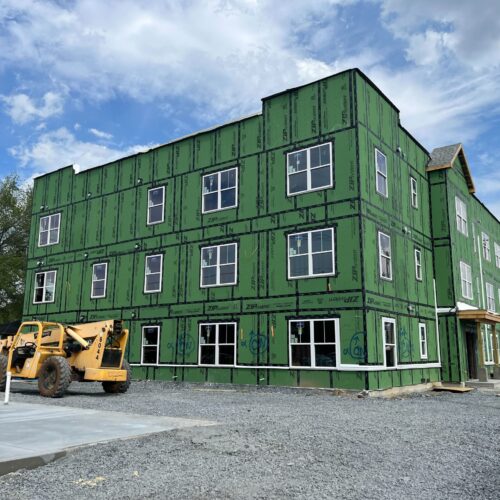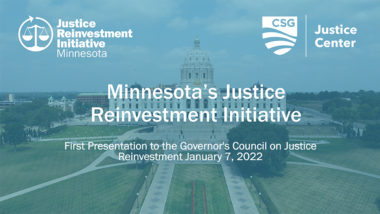
Minnesota Launches Bipartisan, Data-Driven Effort to Address Criminal Justice Challenges
Minnesota has one of the lowest incarceration rates in the country, instead relying heavily on community supervision. The state has the nation’s fifth-highest rate of people on probation, with two in every 100 adults in the state on probation as of 2018.
Despite Minnesota’s intent to keep people in the community, revocations make up a large portion of admissions to prison in Minnesota. More than 60 percent of prison admissions are due to supervision violations, which has caused state leaders to question the efficacy of the state’s current criminal justice policies and investments and pursue additional transparency and accountability for state funds dedicated to supervision.
The annual cost of managing correctional facilities, supporting county supervision partners, and providing reentry services is more than $600 million, of which just over one-fifth is dedicated to community supervision.
Additionally, the state’s probation system has become increasingly inequitable. In 2019, the rate of Black adults on felony probation was nearly five times higher than the rate of White adults on felony probation. For Native American and Latino adults, this rate was more than 9 and 1.7 times higher, respectively, than for White adults. The state is also ill-equipped to adequately support the high number of people with mental illnesses and substance use disorders in the criminal justice system.
To address these challenges, state leaders in Minnesota have launched a bipartisan, interbranch effort to improve community supervision outcomes and increase the likelihood of success for people on probation and supervised release (akin to parole) across all communities in Minnesota.
This effort is part of the federally funded Justice Reinvestment Initiative (JRI) and was jointly initiated by leaders from the state’s executive, legislative, and judicial branches as well as county leadership. The project will involve an extensive review of the state’s spending—particularly related to community supervision—to determine a more equitable funding model that allocates resources to communities across the state based on need.
The extensive review of the state’s criminal justice system will be led by The Council of State Governments (CSG) Justice Center and funded by the U.S. DOJ’s Office of Justice Programs, Bureau of Justice Assistance (BJA) and The Pew Charitable Trusts (Pew).
The CSG Justice Center will work in partnership with the Governor’s Council on Justice Reinvestment—recently assembled by Minnesota Governor Walz—composed of representatives from all three branches of government, county leadership, a Tribal representative, and key criminal justice stakeholders from both greater and metro Minnesota.
© MiguelMalo
This project was supported by Grant No. 2019-ZB-BX-K002 awarded by the Bureau of Justice Assistance. The Bureau of Justice Assistance is a component of the Department of Justice’s Office of Justice Programs, which also includes the Bureau of Justice Statistics, the National Institute of Justice, the Office of Juvenile Justice and Delinquency Prevention, the Office for Victims of Crime, and the SMART Office. Points of view or opinions in this document are those of the author and do not necessarily represent the official position or policies of the U.S. Department of Justice.
 Zero Returns to Homelessness Initiative Launches Nationally, with Pennsylvania Leading the Way
Read More
Zero Returns to Homelessness Initiative Launches Nationally, with Pennsylvania Leading the Way
Read More
 New Hampshire Continues Justice Reinvestment Effort to Improve Conditions for People Who Are High Utilizers of Criminal Justice and Behavioral Health Systems
Read More
New Hampshire Continues Justice Reinvestment Effort to Improve Conditions for People Who Are High Utilizers of Criminal Justice and Behavioral Health Systems
Read More















